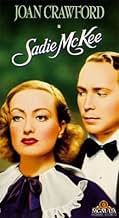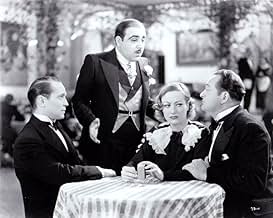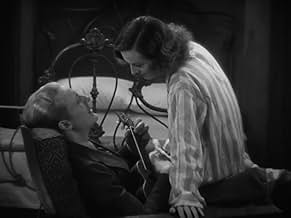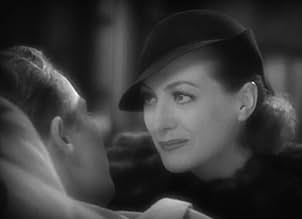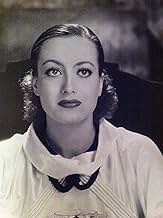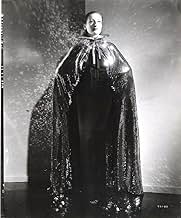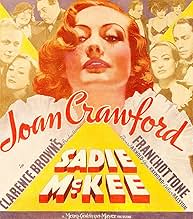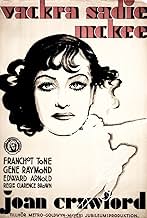IMDb RATING
6.8/10
1.9K
YOUR RATING
A working girl's fortunes improve when she marries into money, but happiness is not so easily won.A working girl's fortunes improve when she marries into money, but happiness is not so easily won.A working girl's fortunes improve when she marries into money, but happiness is not so easily won.
- Director
- Writers
- Stars
- Awards
- 3 wins total
Leo G. Carroll
- Phelps
- (as Leo Carroll)
Candy Candido
- Cafe Entertainer
- (as Candy and Coco)
Otto Heimel
- Cafe Entertainer
- (as Candy and Coco)
Hooper Atchley
- Intern with Dr. Briggs
- (uncredited)
Nellie Bly Baker
- Downstairs Laundress
- (uncredited)
Jack Baxley
- Short-Order Cook
- (uncredited)
- Director
- Writers
- All cast & crew
- Production, box office & more at IMDbPro
6.81.8K
1
2
3
4
5
6
7
8
9
10
Featured reviews
Every Girl Has Her Price And Joan's is High
Well-made Clarence Brown pre-Code soaper with Joan Crawford (Brown directs Joan 5 times) costumed by Adrian (he does this a total of 28 times) and photographed by Oliver T. Marsh (he did a total of 15 films with Joan). First class production crew yields a first class film.
Joan plays a `shopgirl' character that could have had no heart (Barbara Stanwyck would have excelled at such an interpretation) but the writers gave her an innate goodness that warms Sadie McKee to her audience. Edward Arnold stands out as the drunken millionaire that must have served as a role model for Dudley Moore years later in `Arthur.' His sock in the jaw to Joan is unexpected and looks very real. Gene Raymond does well as the love interest and if that was he singing he did it well. His final scene is very good and somewhat unusual. Franchot Tone does not appear to have had the opportunity to develop his character sufficiently to make him more effective. It must have been good enough, because he got Joan after the film was completed. A somewhat zaftig Esther Ralston still manages to demonstrate why she was `The American Venus' and why Raymond spent so much of his time smiling. Why her character does not react to Raymond singing a love song to Joan in the Apollo Theater is beyond me. Leo G. Carroll does a superb job as the butler his distain for the lower class Joan is great.
Joan's character has many choices in this film and she generally comes out ahead with some short deviations into taking what she can get when she can get it. She gives great looks at Arnold when she realizes she must be his lover now that they are married and later to her friend when she exclaims, `So I've got everything, huh?' and while reflecting what she has done after throwing Tone out of her house. Arnold also has choices and responds well to the outcome of the marriage. Although the two policemen in the film do not take the `tip' offered by Joan, they run out after the taxicab man who gets their share presumably to get their cut out outside the presence of Joan.
This is excellent movie making and a must see for Joan Crawford fans (or anyone else that wants to see a good movie). Highly recommended.
Joan plays a `shopgirl' character that could have had no heart (Barbara Stanwyck would have excelled at such an interpretation) but the writers gave her an innate goodness that warms Sadie McKee to her audience. Edward Arnold stands out as the drunken millionaire that must have served as a role model for Dudley Moore years later in `Arthur.' His sock in the jaw to Joan is unexpected and looks very real. Gene Raymond does well as the love interest and if that was he singing he did it well. His final scene is very good and somewhat unusual. Franchot Tone does not appear to have had the opportunity to develop his character sufficiently to make him more effective. It must have been good enough, because he got Joan after the film was completed. A somewhat zaftig Esther Ralston still manages to demonstrate why she was `The American Venus' and why Raymond spent so much of his time smiling. Why her character does not react to Raymond singing a love song to Joan in the Apollo Theater is beyond me. Leo G. Carroll does a superb job as the butler his distain for the lower class Joan is great.
Joan's character has many choices in this film and she generally comes out ahead with some short deviations into taking what she can get when she can get it. She gives great looks at Arnold when she realizes she must be his lover now that they are married and later to her friend when she exclaims, `So I've got everything, huh?' and while reflecting what she has done after throwing Tone out of her house. Arnold also has choices and responds well to the outcome of the marriage. Although the two policemen in the film do not take the `tip' offered by Joan, they run out after the taxicab man who gets their share presumably to get their cut out outside the presence of Joan.
This is excellent movie making and a must see for Joan Crawford fans (or anyone else that wants to see a good movie). Highly recommended.
Sadie Was A Lady
I'd have to describe Sadie McKee as both the typical Joan Crawford vehicle and the typical Franchot Tone vehicle. The two of them who were husband and wife when the film was made are perfectly cast in roles that typified their images in the Thirties.
Crawford is the daughter of a cook on the sumptuous palatial Long Island estate where Tone is the young heir and a lawyer by trade. To earn a few extra bucks Crawford occasionally helps mom out serving at formal meals.
At one of those meals she hears Tone disparaging her sweetheart Gene Raymond who was caught in a petty theft. Tone makes a big point in saying we can't give people like these help because they're no good. Crawford throws a fit and runs to Raymond.
She almost marries Raymond, but he runs out on her for Esther Ralston. In New York working as a nightclub cigarette girl she runs into Edward Arnold who is a millionaire with a severe drinking problem. No doubt caused by drinking a lot of rotgut liquor during recently repealed Prohibition. And wouldn't you know it, Tone is his lawyer.
So Sadie has her three men, give you one guess who she winds up with in the end. You'd probably guess right, but let's say it's a character altering experience for all.
Sadie McKee is probably a good example of the Joan Crawford shop girl before she became a hardened creature like Crystal Allen in The Women. As for Franchot Tone, MGM just loved casting him as rich men in a tuxedo, probably because he looked so darn good in them. The only way either of them escaped type casting was as they got older they varied their parts due to age. Crawford was ever the film star, even in some of the horror flicks she did in the sixties. Tone went right into television and worked steady right up to his death.
Sadie McKee however is a good opportunity to see them both young and at the height of their fame. Also note the Nacio Herb Brown-Arthur Freed ballad All I Do Is Dream Of You comes from Sadie McKee.
Crawford is the daughter of a cook on the sumptuous palatial Long Island estate where Tone is the young heir and a lawyer by trade. To earn a few extra bucks Crawford occasionally helps mom out serving at formal meals.
At one of those meals she hears Tone disparaging her sweetheart Gene Raymond who was caught in a petty theft. Tone makes a big point in saying we can't give people like these help because they're no good. Crawford throws a fit and runs to Raymond.
She almost marries Raymond, but he runs out on her for Esther Ralston. In New York working as a nightclub cigarette girl she runs into Edward Arnold who is a millionaire with a severe drinking problem. No doubt caused by drinking a lot of rotgut liquor during recently repealed Prohibition. And wouldn't you know it, Tone is his lawyer.
So Sadie has her three men, give you one guess who she winds up with in the end. You'd probably guess right, but let's say it's a character altering experience for all.
Sadie McKee is probably a good example of the Joan Crawford shop girl before she became a hardened creature like Crystal Allen in The Women. As for Franchot Tone, MGM just loved casting him as rich men in a tuxedo, probably because he looked so darn good in them. The only way either of them escaped type casting was as they got older they varied their parts due to age. Crawford was ever the film star, even in some of the horror flicks she did in the sixties. Tone went right into television and worked steady right up to his death.
Sadie McKee however is a good opportunity to see them both young and at the height of their fame. Also note the Nacio Herb Brown-Arthur Freed ballad All I Do Is Dream Of You comes from Sadie McKee.
Nobody suffers quite like Joan Crawford
This is often forgotten in Joan Crawford's filmography. It has lots of the ingredients of precode Hollywood, released a couple of month before the inception of the Production Code. It also has lots of the components of the films that Crawford made for MGM of the 1930s, but this one came relatively early in her career and thus seems fresh compared to later similar entries.
Sadie is the daughter of the cook in the home of the wealthy Alderson family. One night when helping out with the serving at dinner, she listens to the son and lawyer of the family (Franchot Tone as Michael) talking about how her boyfriend, Tommy Wallace, is a thief and should get no second chance from the community now that he's been fired from his job. Sadie tells them off and takes off with Tommy (Gene Raymond) to New York City. They have about twenty dollars between them, and pretend to be married to the landlady, planning to be married the next day. Sadie has a job interview, so she and Tommy agree to meet at city hall at noon and be married. He never shows. But this is not an Affair to Remember. Instead, it's exactly what you'd suspect. Brassy nightclub singer Dolly Merrick hears Tommy singing in the boarding house bathroom and offers him a job singing in her act. But the audition would conflict with his wedding. Tommy picks the audition over the wedding, clears out his clothes, and doesn't even leave a note behind.
Sadie, now a hardened jaded woman, gets a job dancing in a night club act where she meets the very wealthy Jack Brennan ( Edward Arnold). He's drunk when he meets her, drunk when he marries her, in fact the guy is perpetually drunk to the point I get tired of him, and it is so hard to get tired of the talented Edward Arnold. The complicating factor is that Michael Alderson is Brennan's lawyer, thinks the worst of Sadie, and is still a pompous glass bowl, although he was right about Tommy having no character. Sadie can't forgive him for that either.
Then comes the day when Sadie is told Brennan will die if he doesn't quit drinking, Sadie sees Tommy again and the old feelings surface, and Michael AND all of the servants think she is just a scheming tramp trying to let Brennan die drinking so she can become the rich widow. Complications ensue.
This film had lots of precode moments. There is the insinuation that Tommy and Sadie, in spite of their promises to each other to wait, do share a bed that one night they are in the rooming house. And there is the delightful Jean Dixon as Sadie's hard boiled friend who looks at the bedroom arrangements after Sadie marries Brennan and says "I've done a lot more for a lot less".
Recommended if it ever comes your way. It packs a lot of plot into its running time.
Sadie is the daughter of the cook in the home of the wealthy Alderson family. One night when helping out with the serving at dinner, she listens to the son and lawyer of the family (Franchot Tone as Michael) talking about how her boyfriend, Tommy Wallace, is a thief and should get no second chance from the community now that he's been fired from his job. Sadie tells them off and takes off with Tommy (Gene Raymond) to New York City. They have about twenty dollars between them, and pretend to be married to the landlady, planning to be married the next day. Sadie has a job interview, so she and Tommy agree to meet at city hall at noon and be married. He never shows. But this is not an Affair to Remember. Instead, it's exactly what you'd suspect. Brassy nightclub singer Dolly Merrick hears Tommy singing in the boarding house bathroom and offers him a job singing in her act. But the audition would conflict with his wedding. Tommy picks the audition over the wedding, clears out his clothes, and doesn't even leave a note behind.
Sadie, now a hardened jaded woman, gets a job dancing in a night club act where she meets the very wealthy Jack Brennan ( Edward Arnold). He's drunk when he meets her, drunk when he marries her, in fact the guy is perpetually drunk to the point I get tired of him, and it is so hard to get tired of the talented Edward Arnold. The complicating factor is that Michael Alderson is Brennan's lawyer, thinks the worst of Sadie, and is still a pompous glass bowl, although he was right about Tommy having no character. Sadie can't forgive him for that either.
Then comes the day when Sadie is told Brennan will die if he doesn't quit drinking, Sadie sees Tommy again and the old feelings surface, and Michael AND all of the servants think she is just a scheming tramp trying to let Brennan die drinking so she can become the rich widow. Complications ensue.
This film had lots of precode moments. There is the insinuation that Tommy and Sadie, in spite of their promises to each other to wait, do share a bed that one night they are in the rooming house. And there is the delightful Jean Dixon as Sadie's hard boiled friend who looks at the bedroom arrangements after Sadie marries Brennan and says "I've done a lot more for a lot less".
Recommended if it ever comes your way. It packs a lot of plot into its running time.
Great Conclusion
In Richley, New York, Sadie McKee (Joan Crawford) works as a maid in the Alderson mansion where her mother is the cook. When the son of their employee, the successful lawyer Michael Alderson (Franchot Tone) that was raised with her, returns from New York after two years, his family offers a dinner party to family and friends. While serving soup, Sadie hears the comments made by Michael about her boyfriend Tommy Wallace (Gene Raymond), who was fired from the Alderson factory accused of being a dishonest person. Sadie reacts and tells that they are insensitive. Sadie decides to flee with Tommy to New York to get married and find job. They befriend Opal (Jean Dixon) and she takes them to the low- budget boardinghouse where she lives. On the next morning, Sadie leaves the boardinghouse to seek a job and marry her beloved Tommy. But his next room neighbor Dolly Merrick (Esther Ralston) overhears him singing and seduces Tommy to travel with her in an itinerant show business. Sadie prepares to return home, but Opal convinces her to stay and finds a job of dancer in a nightclub. Ten days later, Sadie is helped by an alcoholic costumer to get rid of an abusive one and he invites her to join him at his table. She learns that he is the millionaire Jack Brennan (Edward Arnold) and his friend is Michael Alderson. When Michael patronizes her telling to leave Jack, she is still angry with Michael and stays with Jack that proposes to marry her. She accepts and is seen by the society as a gold-digger. But Sadie is still in love with Tommy. What will happen to her?
"Sadie McKee" is a Pre-Code drama with the story of a working girl in love with a rascal that marries a wealthy girl. The role is perfect for Joan Crawford. The amoral story has a great open conclusion where the viewer needs to guess the birthday wish of Michael. My vote is six.
Title (Brazil): "Três Amores" ("Three Loves")
"Sadie McKee" is a Pre-Code drama with the story of a working girl in love with a rascal that marries a wealthy girl. The role is perfect for Joan Crawford. The amoral story has a great open conclusion where the viewer needs to guess the birthday wish of Michael. My vote is six.
Title (Brazil): "Três Amores" ("Three Loves")
The stuff that Joan is made of...
It's easy to see why films like this made Crawford the idol of millions of young women across the country. It's the epitome of a "vehicle".....a film designed to display all the talents of a star and make audiences fall for them. As in many of her early films, she begins at the bottom...the daughter of the cook for a wealthy family including Tone. She gets a hot scene right off the bat when she angrily defends her boyfriend, who is being derided by the aristocrats at the table, by telling them all off (this moment actually brings to mind Emily Watson's similar, yet much more subdued, scene in "Gosford Park".) Soon she and lover Raymond are off to NYC. This section is fascinating as it portrays the way diners were in that era. There's an astonishing coffee dispenser that is shown in one scene and the Automat is quite interesting to behold (not to mention the corned beef hash and 2 poached eggs for $0.35!) Circumstances progress to where she is working in a dance hall (and showing some positively scary legs! It amazing how times have changed in that, today, a similar dancer would have to have sticks for legs and breasts out to there, etc....) Here she becomes associated with a drunken millionaire (Arnold) who takes a major shine to her. Fortunately, for the viewer, she sticks with him, so she can wear an array of dazzling Adrien gowns and furs. Ultimately, each of the men in her life (Tone, Raymond, Arnold) presents her with a variety of conflicts and decisions....all of which she handles with the utmost nobility and grace. She is photographed magnificently throughout with her amazing profile and luminescent eyes featured repeatedly. It's a good thing the film is in black and white because she'd be too much to deal with in color! Everyone knows that Hurrell retouched his amazing portraits of her, but here she looks quite wonderful with just make up and good lighting. The plot is creaky and contrived and the film is just plain out of date, but it's great to see Joan in action in her quintessential role and there's a decent performance from Arnold and nice work by several other supporting players including Hitchcock favorite Carroll. One fun thing to watch for: As a precursor of the later, more antagonistic Crawford, Joan gets fed up with a nightclub singer, barks at her to "Shut up!" and shoves her backwards into a trunk! Fun stuff.
Did you know
- TriviaOne of the first films to treat alcoholism as a serious problem, instead of a comic device.
- GoofsWhen the chauffeur-driven car is pulling up to the estate at the beginning of the film, seen from the rear window only one person is in the back seat. But on the next shot, a side view of the back seat, three people are sitting tightly together in the back seat.
- Quotes
Sadie McKee Brennan: [showing off her bedroom] Here it is.
Opal: Lady, when you say, "I do take thee," how you take him.
Sadie McKee Brennan: [chuckles]
Opal: Got this all to yourself?
Sadie McKee Brennan: Yep, all to myself.
Opal: Always all to yourself?
Sadie McKee Brennan: Yep.
Opal: Well, a whole lot of us do a whole lot more for a whole lot less.
- ConnectionsFeatured in What Ever Happened to Baby Jane? (1962)
- SoundtracksAll I Do Is Dream Of You
(1934) (uncredited)
Music by Nacio Herb Brown
Lyrics by Arthur Freed
Played during the opening credits
Sung by Gene Raymond three times
Sung also by Earl Oxford in a show
- How long is Sadie McKee?Powered by Alexa
Details
- Release date
- Country of origin
- Language
- Also known as
- Vackra Sadie McKee
- Filming locations
- Production company
- See more company credits at IMDbPro
Box office
- Budget
- $612,000 (estimated)
- Runtime
- 1h 33m(93 min)
- Color
- Aspect ratio
- 1.37 : 1
Contribute to this page
Suggest an edit or add missing content

